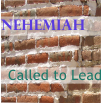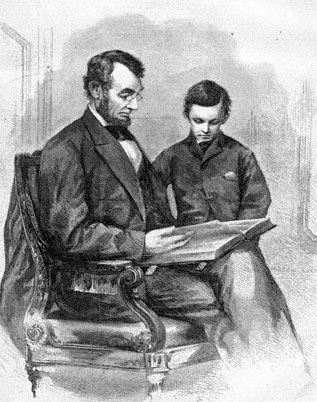
Consider the life of Al. Born in the Kentucky hinterlands, he had a modest upbringing of illiterate parents, lost his mother to fever at age nine. Al lost his first business venture. So he ran for state office, he lost. OK, so Al starts another business which failed.
Two years later his wife dies, Al is devastated. In fact, of his 4 sons, only one lives to manhood. Indefatigable, Al gets up, brushes himself and makes another stab at public office. He loses again. Al develops a b lack depression which he sometimes referred to as “the hypo” or hypochondria, which would haunt him throughout his life, especially after the death of his first wife, Ann.
A third political defeat, a fourth, a fifth political defeat. But then..
Oh did I say Al? I meant to say AL, as in Abraham Lincoln, sixteenth President of the United States, presiding, conducting, and winning the Civil War, Emancipator of slaves, and heals of a nation, “with malice toward none” toward his captives.
In his early life, Lincoln had few books for education, chief among these were Pilgrim’s Progress by Paul Bunyan, and, of course, the Bible. Said Lincoln:
“I believe the Bible is the best gift God has ever given to man. All the good from The Savior of the world is communicated to us through this Book.”

A piece by the Lincoln Institute quotes Joshua F. Speed in an encounter:
“As I entered the room, near night, he was sitting near a window intently reading his Bible. Approaching him I said: “I am glad to see you so profitably engaged.’ ‘Yes,’ said he, “I am profitably engaged.’ ‘Well,’ said I, ‘if you have recovered from your skepticism, I am sorry to say that I have not.’ Looking me earnestly in the face and placing his hand on my shoulder, he said: ‘You are wrong, Speed. Take all of this book upon reason that you can and the balance on faith, and you will live and die a happier and better man.’”.
Source: The Lincoln Institute
Can their there be little doubt that Abraham Lincoln had learned the lessons of another great leader, Nehemiah, whose book Lincoln studied?
Summary / Thoughts
The Wallbuilders
| Nehemiah 3:1 | Although Chapter 3 is mostly an enumeration of the workers, several points bear closer scrutiny. The High Priest and his family arose to build the Sheep Gate, at the north end of the Old City, close to the Temple. This pattern of people rebuilding near their homes is repeated throughout the workforce. |
| Nehemiah 3:5, 27, 31-32 | Although the people of Tekoa, a town about 8 miles southwest of Jerusalem engaged in the building, the town leaders did not, possibly due to Tobiah’s influence. It is possible to do the right thing even when the leaders do not. In fact the Tekoites, to their credit, completed two different sections of the wall. |
| Nehemiah 3:8-9 | The well heeled joined in the work, a testament to Nehemiah’s leadership, and probably their own self-interest. |
Hope is an interesting thing. Sir Francis Bacon remarked that “Hope is a good breakfast, but it is a bad supper.”
Hope in the salvation and return of Christ is a great thing. The hope of Hebrews 6:19 is the anchor of the soul.
But hope demands action. Psalm 9:10 God moves in response to those who put their trust in God.
Nehemiah understood this, and did not wait passively when confronted. As always, his hope, trust, and faith were in God Almighty, but based on that faith, he took action. Some would say outside of hope in its Heb 6:19 context, the opposite of (human, passive) hope is action.
The enemies of the Jews are, in essence, the same today as then:
Nehemiah’s Enemies were:
Sanballat
Tobiah the Ammonite
The Arabs
Discouragement & Defense
| Nehemiah 4:1-3 | Did you think that when you are engaged in God’s call for your life, it was going to proceed without hindrances? Jesus’ enemies and even the ignorant attempted to hamstring Him at every turn. Note that the audience here includes Sanballat’s power base, an doubling of the supposed power of his discouragement. |
| Nehemiah 4:4-5 | Discouragement is perhaps the best weapon the Enemy has in his playbook. And to have 2 different people come at you from different sides, Nehemiah did the first best thing, he prayed. |
| Nehemiah 4:6-9 | The people had a mind to work! Wow, would that we. What distracts you, how do you lose focus? Usually, you don’t really care, or are otherwise unmotivated. It isn’t important. Increase the importance, increase the will to work. |
| Nehemiah 4:10-14 | Exo 14 ias an excellent parallel to this, Moses’ leadership fighting both Pharaoh and his own people, and the “mixed multitude” that departed with the Jews. Nehemiah took definite action and spoke bravely to the leaders and people |
| Nehemiah 4:15-23 | God discourages our enemies. As hard as that is to keep that in mind during trials, it is, nonetheless true. See 2 Sam 17:14, Job 5:12The parallel for us is that we never proceed without our weapons, the full armor of God, to our life. As the Jews did in the work and life, so must we.I wonder how the civilians obtained weapons of war were probably brought in by the army, for the only other reliable manufacturer of weapons was the Philistines, (Ashdod was a Philistine city). They remained vigilant day and night. This too is a parallel for us. 1 Pet 5:8 |
Memory Verse – At whatever place you hear the sound of the trumpet, rally to us there. Our God will fight for us.. Nehemiah 4:20
Application – Take courage, God will fight the battle. Simply show up with the full armor of God.